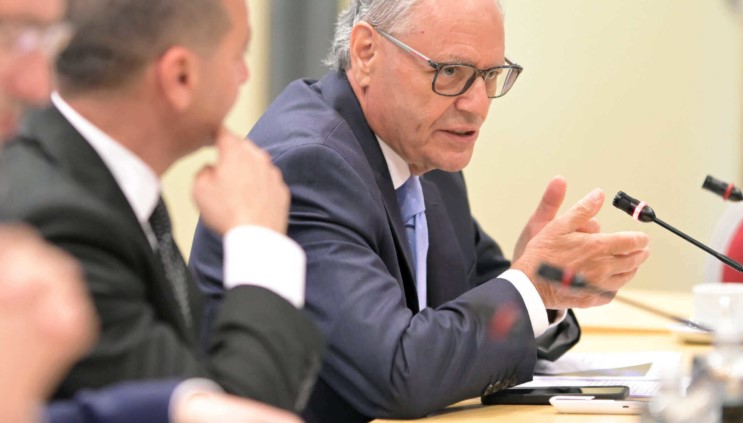Central Bank of Malta Governor Edward Scicluna has been making headlines in recent weeks after it emerged that he will be charged with fraud and the misappropriation of funds following the conclusion of the Vitals inquiry.
Specifically, much has been made of his refusal to resign from his role, despite calls to do so from the Opposition Nationalist Party and civil society organisations.
On Wednesday, as he was entering the courthouse to face the criminal charges, he replied to journalists’ questions regarding his position, arguing that neither the Government, not the Opposition, nor civil society could ask for his resignation.
“There is a big difference between a Governor and a Minister,” he told the media.
“A minister’s position is the prerogative of the Prime Minister, while the role of Governor is governed by the EU Treaty and European Central Bank (ECB) statutes.”
These statues are actually meant to ensure that Central Bank governors within the Eurosystem – the network of central banks of countries using the euro currency – are able to work free from interference by politicians.
In fact, central banks can often pursue objectives that run counter to those of national governments. In determining monetary policy, they are bound to ensure that inflation remains under control using the tools at their disposal – typically in ways that can prove challenging for economic growth.
Article 14.2 of the ECB’s statute says that governors should have terms of no less than five years, to ensure that they are not beholden to the short-term interest of securing a contract renewal.
It further states that a Governor “may be relieved from office only if he no longer fulfils the conditions required for the performance of his duties or if he has been guilty of serious misconduct.”
To determine whether an offence amounts to “serious misconduct”, the decision may be referred to the Court of Justice by the Governor concerned or the Governing Council.
Making Professor Scicluna’s position even more airtight is the additional provision that this misconduct is “on grounds of infringement of [the EU] Treaties or of any rule of law relating to their application.
“Such proceedings shall be instituted within two months of the publication of the decision or of its notification to the plaintiff or, in the absence thereof, of the day on which it came to the knowledge of the latter, as the case may be.”
It merits pointing out that there nothing stopping an ECB Governor from stepping down to clear his name – he is merely not obliged to do so.
Indeed, financial services practitioners BusinessNow.mt spoke to, but who declined to be mentioned by name, described the situation as “outrageous”, pointing out that Professor Scicluna also serves as a board member of the Malta Financial Services Authority.
The ECB has previously stood by Latvian central bank chief Ilmārs Rimšēvičs, who was in December 2023 finally found guilty of accepting bribes. The ECB had initially argued that its support for the Latvian was meant to protect itself from political interference, although a 2021 Court of Justice ruling had made it clear that since his actions were “manifestly not committed in his official capacity,” he was not covered by institutional immunity.
There are several other cases of ECB governors running afoul of the law, including current ECB President Christine Lagarde and a previous holder of that position, Jean-Claude Trichet.
These and others are listed in detail in a report by Politico released on Tuesday, inspired by the curious case of the Maltese central banker being charged with fraud.
In any case, the entire proceedings that saw Professor Scicluna being charged before submitting a ‘not guilty’ plea were ultimately nullified due to a procedural issue, meaning that as of this moment, he has not been officially charged.
Two years since its birth, Moneybase features on Microsoft’s Customer Stories
Moneybase has now just been featured on Microsoft’s latest Customer Stories
Finance Minister confirms continuity of food and energy subsidies
Spending on food and energy subsidies as a percentage of the GDP will be at 0.7% in 2025
MHRA congratulates Glenn Micallef on EU role, highlights positive impact on Malta’s tourism and cultural sectors
The lobby group emphasised that Malta’s cultural assets and sports scene are key factors in attracting visitors and fostering economic ...






